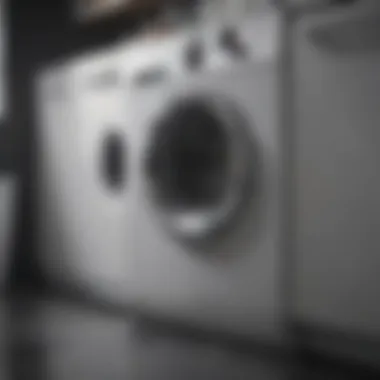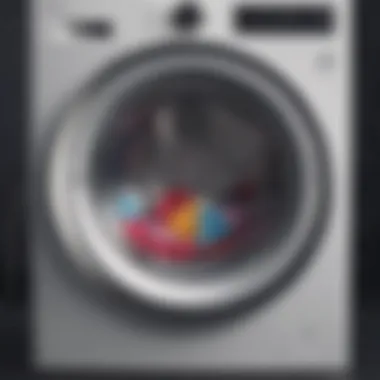Washing Your Washing Machine with Vinegar: A Comprehensive Guide


Intro
In the pursuit of household cleanliness, many may overlook the often-neglected washing machine. This appliance, essential for maintaining fresh laundry, can develop build-up over time, which affects its function. An effective and eco-friendly solution to this problem lies in using vinegar.
Vinegar, a common household item, serves not just as a condiment but also as a powerful cleaning agent. Its acidic nature effectively breaks down mineral deposits, soap scum, and mildew, commonly found in washing machines. Understanding how to properly wash your washing machine with vinegar can prolong its lifespan and enhance its performance.
This guide offers an in-depth look into the benefits of using vinegar, the method of application, and some potential drawbacks. By following the outlined steps, users can ensure that their washing machine remains clean, hygienic, and efficient. Let's explore this method in greater detail.
Preamble to Washing Machines and Maintenance
Washing machines are essential appliances in modern households, providing convenience and efficiency in laundry care. Understanding these machines and their maintenance is crucial for enhancing their longevity and optimal performance. Appropriate maintenance practices can prevent common issues such as unpleasant odors, mold formation, and mechanical malfunctions. This guide aims to address these issues using a natural cleaning solution: vinegar.
Having a sound knowledge of washing machines enables users to make informed decisions about usage and maintenance. Additionally, it highlights the importance of an effective cleaning regimen that extends the lifespan of the machine while also ensuring the cleanliness of clothes. This article will underscore vital maintenance practices, focusing particularly on the use of vinegar, thereby enhancing both machine hygiene and overall appliance efficiency.
Understanding Washing Machines
Washing machines come in various types, including top-loading and front-loading models. Each design has its unique mechanisms and components, which require specific attention during maintenance. Key parts involve the drum, pump, and various seals, all of which play a vital role in effective washing.
Every appliance will accumulate residues from laundry detergent, fabric softener, and lint over time. These residues can lead to build-up within the machine that not only hampers performance but also creates a favorable environment for mold and bacteria, posing health risks. Recognizing this necessity for clean machines fosters a responsibility among users to implement maintenance routines.
Why Regular Maintenance is Essential
Regular maintenance of washing machines is not merely a suggestion but a necessity. Possible outcomes from neglecting maintenance can include:
- Reduced Efficiency: A machine that is not clean cannot operate effectively, leading to longer wash cycles and insufficient cleaning of clothes.
- Odors: Over time, washing machines can develop unpleasant smells due to trapped moisture and build-up. This can transfer to laundry.
- Mechanical Failures: Lack of maintenance can exacerbate issues, leading to costly repairs or complete breakdowns of the machine.
Incorporating a simple maintenance routine that utilizes vinegar can mitigate these problems effectively. This guide will delve deeper into how vinegar acts as a natural cleaning agent and provide step-by-step instructions for integrating it into regular washing machine care.
The Role of Vinegar in Household Cleaning
Vinegar holds a significant position in the realm of household cleaning. Its versatility and effectiveness make it a suitable option for various cleaning tasks. In the context of washing machines, vinegar serves both as a powerful cleaning agent and a means to maintain the integrity of the appliance. Understanding the role of vinegar in household cleaning is crucial for anyone looking to enhance their home management practices.
The benefits of vinegar include its affordability, accessibility, and natural properties. Unlike commercial cleaners that often contain harsh chemicals, vinegar is biodegradable and safer for both the environment and human health. When used thoughtfully, it can lead to effective cleaning outcomes without the drawbacks associated with synthetic products. Integrating vinegar into cleaning routines not only facilitates better hygiene but also promotes sustainable practices in daily life.
Chemical Composition of Vinegar
Vinegar primarily consists of acetic acid, typically ranging from 4% to 8%, along with water. This unique acid is what gives vinegar its characteristic sour taste. The presence of acetic acid is essential, as it endows vinegar with potent antibacterial and antifungal properties. These characteristics enable vinegar to combat mold, bacteria, and unpleasant odors effectively.
In addition to acetic acid, vinegar may include trace amounts of other compounds, depending on the source. For instance, apple cider vinegar is made from fermented apple juice, which can introduce additional nutrients and enzymes. Despite these variations, all types of vinegar retain their fundamental cleaning properties, making them suitable for household use.
Vinegar as a Natural Cleaner
As a natural cleaner, vinegar stands out for its effectiveness in addressing a range of cleaning challenges. It can effectively dissolve mineral deposits, grease, and soap scum, which frequently accumulate in washing machines. The natural acidity of vinegar means that it can cut through tough residues without damaging many surfaces, making it a reliable choice for both internal and external cleaning of appliances.
The use of vinegar also minimizes reliance on harsh chemicals, which can release volatile organic compounds (VOCs) into the environment. This aspect is particularly relevant for individuals who are health-conscious or environmentally aware. Moreover, vinegar's ability to neutralize odors adds an extra layer of value to its use as a cleaning agent. In essence, leveraging vinegar for household cleaning, especially in washing machines, enhances maintenance routines while being mindful of health and environmental factors.
Benefits of Using Vinegar in Washing Machines
Understanding the benefits of using vinegar in washing machines is essential for those seeking effective maintenance solutions. Many householders are not aware that vinegar, a common kitchen staple, serves multiple purposes beyond cooking. Its cost-effectiveness and natural properties make it an appealing alternative to commercial cleaning agents. This section elucidates the specific benefits of vinegar, which can contribute to a cleaner, more efficient washing machine. It's paramount to recognize how such simple substances can enhance appliance care.
Removal of Residue and Odors
Washing machines accumulate residue from laundry detergents, fabric softeners, and minerals present in water. Over time, these residues may harbor mildew and unpleasant odors. Vinegar acts as a powerful natural cleaner that efficiently breaks down these deposits. When vinegar is introduced into the washing machine during a cleaning cycle, it penetrates the grime that water alone may fail to dislodge.
This process not only eliminates built-up detergent but also neutralizes odors, leading to fresher laundry results. Many users have reported a noticeable improvement in the scent of cleaned clothes after incorporating vinegar into their routine.
- Steps for Residue Removal:
- Select a hot water cycle.
- Add two cups of white vinegar into the detergent drawer.
- Allow the machine to run through a full cycle without laundry.
This practice effectively removes residues and restores the washer's clean state. Regular use of vinegar as part of laundry maintenance can significantly reduce future odor problems.


Descaling and Maintenance of Components
Hard water can lead to scale deposits within the washing machine. These deposits can affect various components, such as heating elements and hoses, potentially leading to decreased efficiency and longevity. Vinegar's acidic nature makes it a suitable descaling agent. It not only dissolves scale buildup but also helps in maintaining essential components of the washing machine, ensuring they continue functioning optimally.
- Benefits of Descaling with Vinegar:
- Prolongs lifespan of heating elements.
- Enhances washing efficiency by ensuring optimal water flow.
- Prevents costly repairs related to scale buildup.
To utilize vinegar for descaling:
- Fill the washer with hot water.
- Mix in two cups of white vinegar and let it sit for about an hour.
- Run a full wash cycle without laundry.
Integrating this method into regular cleaning routines not only maintains appliance function but also helps in saving money in the long run.
Step-by-Step Guide to Washing Your Washing Machine with Vinegar
Cleaning your washing machine is a crucial task that often gets overlooked. The step-by-step guide serves two main purposes. First, it provides a structured approach to ensure thorough cleaning. Second, it enhances understanding of why each step is important in maintaining appliance hygiene. A well-maintained washing machine improves efficiency and extends its lifespan. Therefore, following a clear guide is essential.
Gathering Necessary Materials
Before starting the cleaning process, it's important to gather all necessary materials. This ensures a smooth and efficient workflow. You will need:
- White vinegar, known for its effectiveness in cleaning and deodorizing.
- A clean cloth or sponge for wiping surfaces.
- Optional: baking soda for added cleaning power.
Having materials ready saves time and makes the cleaning process more organized. This preparation eliminates interruptions, allowing the cleaning to be done in one go.
Preparing the Washing Machine
Now that you have gathered the materials, it’s time to prepare the washing machine. First, remove any clothing or items inside the machine. This step is essential as it ensures the clean cycle focuses solely on the machine itself.
Next, inspect the machine for any visible dirt or residue. Wipe down areas that might contain soap scum or lint using a damp cloth. Ensuring the machine is free of obstructions before the cleaning cycle allows vinegar to penetrate and disinfect effectively.
Executing the Cleaning Process
Executing the cleaning process is where all previous steps come together. Each part of this process plays a vital role in sanitizing the washer and removing buildup.
Selecting the Right Cycle
Choosing the right cycle is fundamental. Most washing machines have a self-cleaning cycle, which is specifically designed for cleaning without any clothes. Running this specific cycle maximizes the effects of vinegar. It ensures that hot water mixes well with the vinegar, which helps dissolve mineral deposits and residue effectively.
Choosing the right cycle also minimizes wear and tear on the machine. This is a beneficial approach, ensuring the appliance operates efficiently after cleaning.
Adding Vinegar
The next step is adding vinegar, which acts as the main cleaning agent. Pour about two cups of vinegar into the detergent dispenser before starting the wash cycle. This allows the vinegar to distribute evenly throughout the wash.
Adding vinegar is crucial as it not only cleans but also neutralizes odors that often linger. The acidity of vinegar breaks down stubborn grime, making it a popular choice in household cleaning. This step is straightforward but bears significant weight in achieving the desired outcome.
Running the Machine
Finally, you will run the machine as per the selected cycle. Let it complete the entire process without interruption. It's important to note that running the machine through a full cycle ensures thorough cleaning of all parts, including hoses and drum areas that are often neglected.
After the cycle ends, it is advised to run an additional rinse cycle with plain water to remove any leftover vinegar scent. This second run helps crystallize the cleaning benefits achieved earlier. Completing this ensures that the washing machine is not only clean but ready for the next load of laundry.
Post-Cleaning Care and Maintenance
Post-cleaning care and maintenance are crucial steps in ensuring the longevity and optimal functioning of your washing machine after utilizing vinegar for cleaning. Engaging in thoughtful maintenance practices can help prevent future issues and keep your machine running efficiently. Vinegar cleaning effectively removes build-up and odors, but the process must be followed with diligent care to sustain the benefits.
Inspecting for Residual Build-Up
After you have cleaned your washing machine with vinegar, it is important to perform a thorough inspection for any remaining residues. Sometimes, the cleaning process may not eliminate all residue completely. Check the detergent drawer, door seals, and drainage filters. Residual build-up can lead to odors or even mold growth eventually.
- Detergent Drawer: Open the drawer and inspect it for any clumps or sticky residues. Clean it with a damp cloth if you notice anything unusual.
- Door Seals: Examine the rubber seals around the door. These areas tend to trap moisture, which can cause mold if they are not dried regularly. Wipe them with a vinegar solution to keep them clean.
- Drainage Filters: Locate and clean the drainage filters as per the manufacturer's instructions. Accumulations here can block water flow during wash cycles.


"Regular inspections can help avert more serious maintenance problems down the line."
Recommendations for Ongoing Maintenance
To maintain a washing machine that has been cleaned with vinegar, it is essential to establish a routine care regimen. This proactive approach can extend the life of the appliance and improve washing results.
- Monthly Cleaning: Consider performing a vinegar cleaning every month or so, depending on your usage frequency. This will help limit build-up and keep your washing machine fresh.
- Wipe Down After Use: After every wash, take a moment to wipe down the door and seals. Leaving moisture can encourage mold growth.
- Use the Right Cycle: Make sure you select the appropriate cycle for different fabrics. Varied washing modes help prevent stress on the machine.
- Monitor Usage: Overloading the washing machine can cause excessive strain and reduce its lifespan, potentially leading to repairs. Track your load sizes and avoid going beyond the recommended limits.
- Check Hoses: Regularly inspect and replace hoses if they show signs of wear, bulging, or leaks. Hoses are often overlooked but are vital for the machine's performance.
By implementing these strategies, you can significantly enhance the overall health of your washing machine, facilitating more effective cleaning and prolonging its usefulness for years to come.
Common Concerns about Using Vinegar
The use of vinegar as a cleaning agent for washing machines prompts various concerns among users. As many people aim to maintain their appliances effectively, it is important to address these issues to ensure a safe and effective cleaning process. This section explores potential damage to washing machine components and compares vinegar with commercial cleaners, which highlights the viability of vinegar as a practical solution for appliance maintenance.
Potential Damage to Washing Machine Components
One concern that surfaces often is the potential damage vinegar may cause to different components of washing machines. It is crucial to understand that while vinegar is an acidic substance, when diluted properly, its impact on washing machines is generally minimal. However, certain components, such as rubber seals and gaskets, may be sensitive to prolonged exposure to acidic solutions. Over time, vinegar can weaken these parts, leading to leaks or moisture retention.
To mitigate this risk, it is advisable to:
- Use vinegar in moderation: Limit usage to occasional cleaning rather than frequent or excessive applications.
- Dilute vinegar: Combine equal parts of vinegar and water for a less acidic solution. This adjustment helps minimize any potential adverse effects on materials.
- Inspect components regularly: After cleaning, check seals and rubber parts to ensure they remain intact and functional.
With these precautionary measures, the likelihood of damage can be significantly reduced, allowing users to take advantage of vinegar’s benefits without compromising the machine’s longevity.
Vinegar Versus Commercial Cleaners
Another common question arises when comparing vinegar with commercial cleaners available in the market. Many individuals prefer packaged products due to their advertised effectiveness. However, several factors should be considered before making a choice between vinegar and commercial alternatives.
Cost-Effectiveness: Vinegar generally proves to be more affordable than most commercial cleaning agents. Purchasing a bottle of distilled white vinegar is noticeably cheaper than specific washing machine cleaners.
Environmental Implications: From an ecological perspective, vinegar is a more sustainable option. It is biodegradable and does not contribute to environmental pollution, unlike chemical cleaners that may contain harsh substances harmful to the planet.
Efficiency: While some commercial cleaners are formulated to tackle tough stains and build-up, vinegar has demonstrated notable efficacy in removing odors and mineral deposits. Its versatility in cleaning can make it a viable alternative for routine maintenance tasks.
Both vinegar and commercial cleaners have their respective merits. Individuals should weigh their priorities—whether cost, environmental concerns, or specific cleaning challenges—when selecting a cleaning agent.
"By considering the risks and benefits of each option, users can make informed decisions that best support their washing machine maintenance routines."
Ultimately, understanding the potential concerns and making informed choices can enhance the cleaning experience while promoting the longevity and performance of washing machines.
Frequency of Cleaning Your Washing Machine
Understanding the frequency with which you should clean your washing machine is crucial for maintaining its efficiency and longevity. Many people overlook this aspect, assuming that regular cycles will automatically keep their machines clean. However, neglecting this care can lead to buildup of grime, mold, and odors. This section will outline recommended cleaning intervals and signs that it’s time to take action.
Recommended Cleaning Intervals
In general, it is advisable to clean your washing machine with vinegar every one to three months. This frequency helps to keep the internal components and drum clear of residue and build-up. Factors like laundry load frequency, usage of fabric softeners, and the water quality in your area can influence how often cleaning is necessary.
- If you use your machine daily: Clean it every month.
- If you use it a few times a week: Every two months is a good interval.
- If you rarely use it: Cleaning every three months can be sufficient.
Regularly checking the condition of your machine will help determine the need for more frequent cleanings.
Signs Your Washing Machine Needs Cleaning
Knowing the indicators that your washing machine requires a cleaning cycle can save you from larger maintenance issues down the line. Here are some common signs:
- Strong Odors: A foul smell coming from your washer typically indicates mold or mildew growth.
- Visible Residue: Any kind of buildup, particularly in detergent dispensers or the rubber gasket, signals that it's time to clean.
- Slow Drainage: If water does not drain properly, it can mean that the internal workings are blocked.
- Discolored Clothes: If your laundry comes out looking dingy or smelling bad, the machine may need a cleaning.
- Rust or Corrosion: Check the outer body and drum for any signs of rust, indicating wear that can affect performance.
Regular cleaning not only keeps your appliance looking good but also extends its functional life.
Monitoring for these signs and adhering to recommended cleaning intervals will enhance the performance of your washing machine. This proactive approach to maintenance can save you from costly repairs in the future.
Alternative Cleaning Methods


In maintaining the washing machine's cleanliness, several alternatives to vinegar exist. Each of these methods offers unique advantages, and understanding them can enhance your appliance's longevity. While vinegar is well-known for its effectiveness, sometimes users seek additional options to diversify their cleaning regimen. This section covers two prominent alternatives: baking soda and bleach.
Baking Soda as a Cleaning Agent
Baking soda is not just a baking ingredient; it serves a vital role in cleaning as well. Its alkaline properties help neutralize odors and break down stains. Incorporating baking soda into your cleaning routine can assist in removing stubborn residue accumulated over time.
When using baking soda, the process typically involves the following steps:
- Add a Half Cup of Baking Soda: This quantity is sufficient for a standard-sized washing machine. Pour the baking soda directly into the drum.
- Run a Hot Water Cycle: Set the machine to a hot water cycle. This ensures the baking soda gets activated effectively.
- Follow with Vinegar if Desired: To enhance its effectiveness, some users choose to follow this with a vinegar rinse.
Baking soda is particularly advantageous because it is non-toxic and inexpensive. Furthermore, it is readily available in many households, making it a practical choice for regular cleaning.
Bleach and Its Cautions
Bleach can be an effective cleaning agent for washing machines, particularly when dealing with mold or mildew. However, caution is essential when integrating bleach into your cleaning routine.
Here are some key considerations when using bleach:
- Dilution Is Key: Always dilute bleach before use. A common ratio is one cup of bleach mixed with a gallon of water.
- Use in an Empty Machine: Run the machine without any laundry to effectively clean the drum.
- Alternating Use: Avoid using bleach and vinegar together, as this can create harmful gases. Choose one cleaning agent for each cycle.
Although bleach is highly effective in eliminating certain bacteria and stains, its intense chemical nature may not suit everyone. Some users prefer natural alternatives due to sensitivity to strong chemicals. Always weigh the pros and cons before deciding on the cleaning method.
Always handle bleach in a ventilated area and wear gloves for protection.
The Environmental Impact of Cleaning Products
Understanding the environmental impact of cleaning products remains a significant part of this article. With an increasing awareness of sustainability, many consumers are looking for safer, more eco-friendly alternatives to traditional cleaners. Household cleaning products have various effects on nature, including pollution and the depletion of resources. It is essential to consider these factors when choosing cleaning agents for machines in our homes.
When we choose products, we should evaluate their components. Conventional cleaners often contain harsh chemicals that can harm aquatic life when they enter waterways. They can also contribute to indoor air pollution, affecting our health. Consumer behavior is shifting towards products that minimize these risks, hence the relevance of using vinegar in maintenance routines. It stands as an effective alternative, combining cleaning efficiency with a much lower environmental footprint.
Sustainability of Vinegar
Vinegar offers a sustainable option for cleaning. This natural product, derived from fermenting ethanol, is biodegradable. This means that when it goes down the drain, it does not leave toxic residues. Additionally, vinegar comes from renewable resources, making it preferable in comparison to many commercial cleaning products.
Moreover, vinegar's production typically requires less energy than that of synthetic cleaners. The minimal processing needed for vinegar means reduced carbon emissions during its lifecycle. Its versatility as a household cleaner also reduces the need to purchase multiple products, which further cuts down waste.
Key Benefits of Vinegar in Cleaning:
- Biodegradable: It breaks down naturally without harming the environment.
- Less Energy-Intensive: Production demands lower energy compared to commercial chemical cleaners.
- Cost-Effective: One product can serve multiple cleaning purposes.
In summary, vinegar embodies several principles of sustainability, making it a wise choice for environmentally conscious consumers.
Comparing Vinegar with Chemical Cleaners
When contrasting vinegar with chemical cleaners, various elements come to the forefront. First, effectiveness is a considerable factor. Vinegar is known for its ability to cut through grease, eliminate odors, and act as a natural disinfectant. While it might not perform as aggressively as some commercial products, it completes many home cleaning tasks satisfactorily.
Moreover, the safety profile of vinegar is another point in its favor. Traditional cleaners can pose serious health risks, particularly if ingested or if their fumes are inhaled. Vinegar, on the other hand, poses little danger in common household situations.
Considerations include:
- Effectiveness: Both cleaners have their strengths; chemical cleaners may excel in tough stains while vinegar is praised for routine maintenance.
- Safety: Vinegar is generally safe for small children and pets, unlike many chemical solutions, which carry warnings.
- Cost: Vinegar is typically cheaper than leading brands of chemical cleaners.
While vinegar is not a universal solution for every cleaning challenge, its role in maintaining a washing machine is invaluable. Adopting vinegar as part of a cleaning routine can lead to both improved appliance longevity and a healthier home environment.
The End: The Efficacy of Vinegar in Washing Machine Care
Vinegar has shown to be an effective agent for maintaining washing machines. Its utility as a natural cleaner is particularly beneficial for those who desire a more environmentally friendly option for household maintenance. Furthermore, understanding how to effectively utilize vinegar ensures that users can prolong the lifespan of their appliances while also enhancing their operational efficiency. Regular use of vinegar in cleaning cycles can help in reducing residue and unpleasant odors frequently associated with long-term use of washing machines.
Summary of Key Points
- Vinegar's Role: Vinegar is an acidic solution that aids in breaking down limescale and soap scum, ensuring a thorough cleaning process.
- Cost-effectiveness: Unlike many commercial cleaners, vinegar is economical and widely available. It provides a budget-friendly solution without compromising efficacy.
- Eco-Friendliness: Vinegar is biodegradable and poses fewer risks to aquatic life compared to harsh chemical cleaners. This aspect attributes to a more sustainable approach to home care, aligning with the growing emphasis on environmental consciousness.
- Versatile Use: Beyond washing machines, vinegar can be applied in various cleaning contexts around the home, further amplifying its value as an all-purpose cleaner.
Final Thoughts on Maintenance Practices
Incorporating vinegar into your washing machine maintenance routine can not only enhance cleanliness but also serves as a preventive measure against future issues. Establishing a cleaning schedule that includes vinegar rinses can drastically improve the performance of the machine. A suggested practice is to carry out the cleaning every month or two months, based on usage frequency.
Additionally, while vinegar is generally safe, awareness of equipment specifications and potential manufacturer recommendations is prudent. Certain washing machines, especially high-efficiency models, might have specific guidelines regarding the use of vinegar. Therefore, consulting the user manual is essential prior to implementation.
In summary, leveraging vinegar for washing machine maintenance encapsulates a blend of effectiveness, cost-saving, and eco-friendliness. By adopting this practice, homeowners can achieve cleaner machines and ultimately contribute to the longevity of their appliances.















